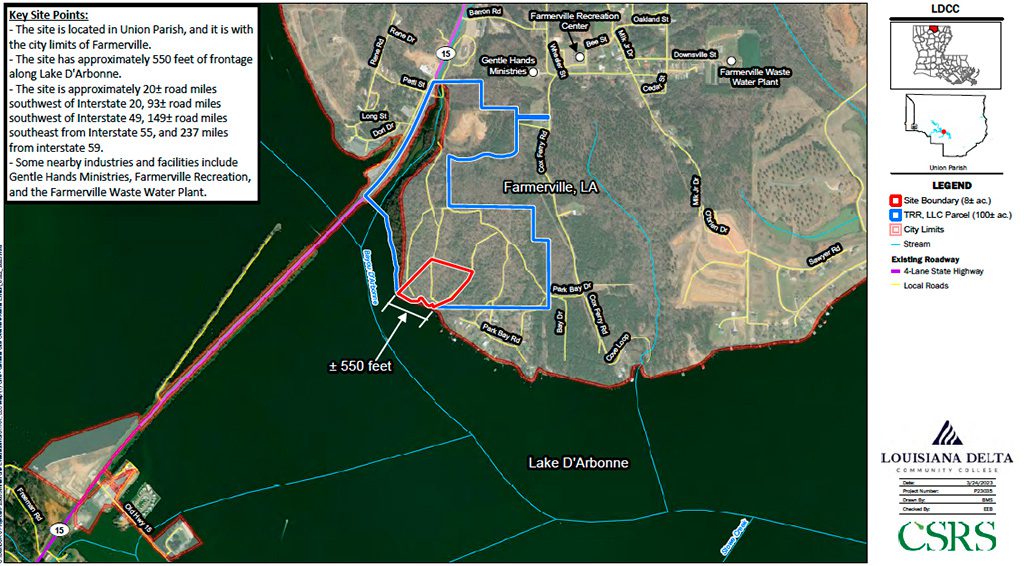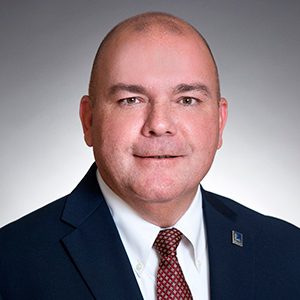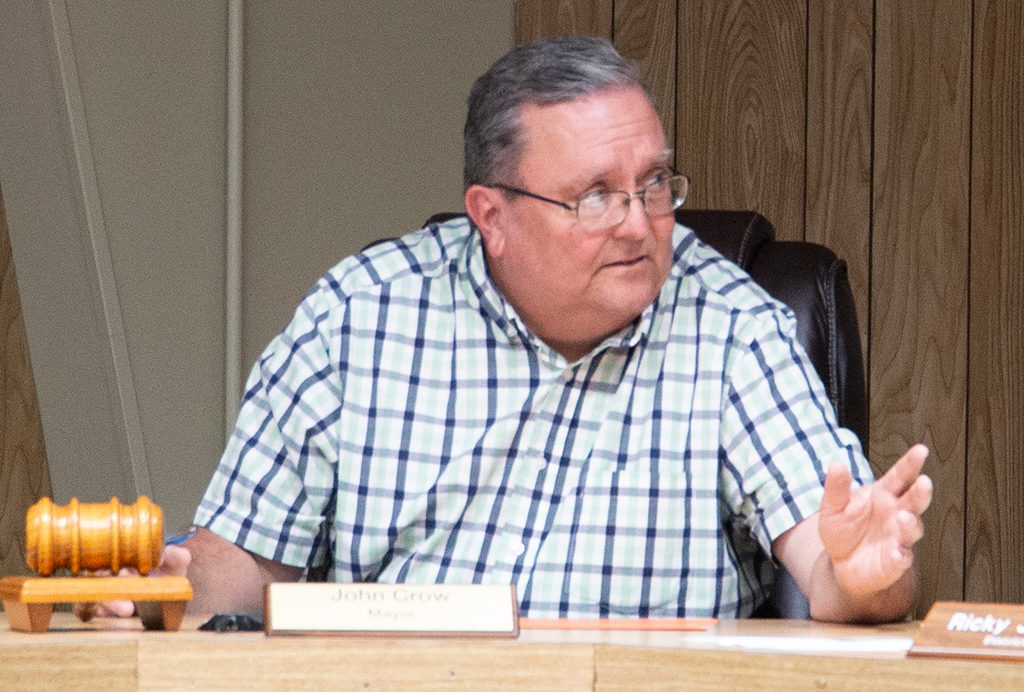Campus will overlook Lake D’Arbonne and offer a ‘Sportsman’s Paradise’ curriculum
By Luke Britt/Editor
Wednesday’s decision by the Louisiana Community and Technical College System to build a new $18 million Farmerville campus on a hill overlooking Lake D’Arbonne seems to have been driven by three things: location, location, location.
According to the site selection report that prompted the LCTCS decision, a hilltop view of Lake D’Arbonne and 550 feet of lakefront property are so important to the project that they trump virtually all other factors.
The Farmerville campus will be a part of the Louisiana Delta Community College system, which comes under the statewide oversight umbrella of the LCTCS.
Officials said they do not yet know when construction will begin.
“LDCC has established a strategic vision for the Farmerville Campus to create a facility very different than the trades shop and mid-century style classrooms that proved unsustainable in the past,” the report said. “The Sportsman’s Paradise-themed campus outlined by LDCC has clear requirements that must be in place to meet the proposed campus vision.”
That report was prepared by the project management firm CSRS LLC, which LDCC hired to assess and compare the relative merits of the two properties.
The 8-acre hilltop property chosen for the new campus is owned by TTR LLC, a company whose local owners include Jered Ramsey, Leslie Townes and Caskey Terral. TTR has offered to sell the property to LDCC for $1.2 million, according to the CSRS report.

The area outlined in red shows the property chosen by the Louisiana Community and Technical College System as the site of the new Louisiana Delta Community College Farmerville campus.
The second property is a five-acre tract of land owned by Johnny Dollar’s Deloutre Property Rentals LLC. Dollar offered to donate the property to the college system, the report said.
CSRS’s first task was to conduct an Initial Site Evaluation (ISE), the purpose of which was to determine whether either site possessed physical constraints that made it unsuitable for development, such as the presence of a protected habitat, proximity to the 100-year flood plain or any property rights or right of way disputes. CSRS determined that both properties are free from such encumbrances and suitable for development.
CSRS was then tasked with assessing the extent to which the two properties supported the LDCC’s vision for the campus.

““The college does not want to develop a campus that you traditionally thought of as your technical skills or trades campus,” LCTCS Director of Operations Joe Marin said. “(LDCC) wants to develop a campus specific to wildlife and fisheries and sportsman training, and it will be the only one in the state.”
Joe Marin, LCTCS Director of Operation
“The college does not want to develop a campus that you traditionally thought of as your technical skills or trades campus,” LCTCS Director of Operations Joe Marin said. “(LDCC) wants to develop a campus specific to wildlife and fisheries and sportsman training, and it will be the only one in the state.”
To compare the sites, CSRS developed a scoring matrix that graded both sites in three major categories – infrastructure, land use and campus vision – and within those were 13 sub-categories.
The Infrastructure category compared the two sites along largely conventional development lines, such as purchase costs and the availability of utilities and road access. The Land Use category assessed whether there were any environmental issues, such as an underground pipeline, or cultural issues, such as a historically protected structure, that might impede the project.
The two sites’ potential for flooding was also compared, and the surface area within each that might be deemed wetlands was measured.
According to CSRS, the Deloutre Property, if donated, would cost nothing to acquire, is already cleared, and has a road and utilities in place. The TTR property has not been cleared and has no road access or utility service. CSRS also determined that the Deloutre property has a lower flood risk and less potential wetland area than the TTR property.
According to Marin, CSRS’s most important responsibility was to determine not which site would be the easiest or least costly to develop, but which property best facilitated the “Sportsman’s Paradise” vision.
Delta outlined that vision in a proposal called the Farmerville Campus Vision Concept, which says that one of the college’s goals is to establish partnerships with boat motor and boat manufacturing companies to develop a skilled marine sport technician curriculum. In their report, CSRS consultants wrote that “immediate access to Lake D’Arbonne is critical to that requirement.”
The property Dollar offered to donate is located south of Highway 2 at the end of Glory Road and is approximately 1,750 feet from the lake. To address the water access requirement, Dollar offered to construct a 4-acre lake adjacent to the property, but CSRS judged that solution to be insufficient for the motor sports program LDCC wants to build.
According to the scoring system used to grade the two sites, the direct access requirement – more than all the other considerations combined – led CSRS to recommend the hilltop site over the Deloutre Property site.
Another key requirement, according to CSRS, is that the site be visible from a major roadway. The TTR hilltop site is “clearly visible from Highway 33 when crossing Lake D’Arbonne”, while the Deloutre Property “has limited visibility from Highway 2, and visibility is impeded by existing development between the highway and the site.”
In the end, CSRS determined that the additional cost associated with developing the hilltop site was a necessary expense if LDCC wishes to fully realize its stated goal of building a unique marine and sportsman-themed campus.
“The TTR LLC site is best suited for the future Farmerville campus with the distinguishing factors being the immediate waterfront access to Lake D’Arbonne and visibility from LA Highway 33,” the consultants wrote in their report.
“I am happy the community college dream is finally coming true,” Dollar said. “The economic development that comes with it will benefit us all. I have concerns about the costs and infrastructure issues associated with building a campus on top of a hill that, at the bottom, they are going to build a mega boat ramp. That said, now is not the time to throw shade. I’ll just say it’s a good day for Union Parish and leave it at that.”

“Just picture it. The first thing people will see coming across that bridge is a beautiful college campus on a hill with a mega ramp at the bottom. All that activity, all that business, all those families enjoying themselves, all those Union Parish kids getting an education. People are going to know that Union Parish is on the ball.”
Mayor John Crow
Dollar was referring to the mega boat ramp currently in the design phase that will be constructed at the base of the hill where the community college will reside. The CSRS report does not mention the mega ramp.
The mega ramp project, announced in August of last year, includes a parking lot with 100 oversized truck-trailer parking spots, a three-lane boat ramp, two pavilions with restrooms, a cleaning station, a stage for special events and 18 “short-term parking” slots on the water where people can park their boats temporarily while they prepare to launch or remove them from the lake.
“Just picture it. The first thing people will see coming across that bridge is a beautiful college campus on a hill with a mega ramp at the bottom. All that activity, all that business, all those families enjoying themselves, all those Union Parish kids getting an education. People are going to know that Union Parish is on the ball.”
 fgazette.com Community news site for Union Parish Louisiana
fgazette.com Community news site for Union Parish Louisiana